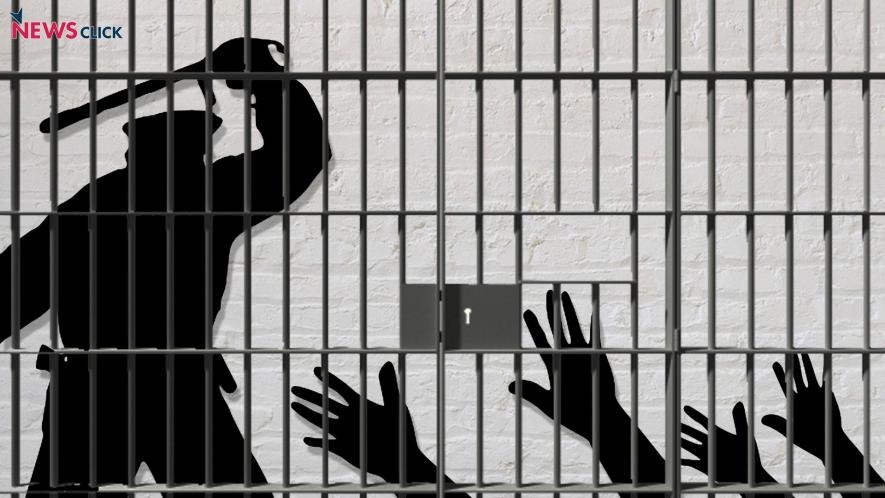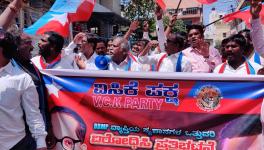Why No “Zero Tolerance” To Custodial Deaths,Human Rights Forum Asks AP CM

Why No “Zero Tolerance” To Custodial Deaths, Human Rights Forum Asks AP CM
NEW DELHI: Between December 2017 to November 2018, at least nine persons have died allegedly of police torture across Andhra Pradesh, reveals a fact-finding study by Human Rights Forum (HRF). Flagging the incidents of police violence, HRF released an open letter on January 3, to Chief Minister N Chandrababu Naidu, calling for police personnel responsible for custodial deaths of suspects to be booked under IPC 302 (murder) and other relevant sections of the law.
The rights body sought the state government to comply with the Supreme Court and High Courts directives and expedite “setting up of the Police Complaints Authority at both the State-level and in every district and for them to be operationalised in a substantive and meaningful manner.”
Fact-findings in cases of custodial violence in the state revealed that a total of nine persons, all from the marginalised sections and mostly accused in theft cases, have died as a result of police maltreatment in lock-ups. Of them, five died as a direct result of alleged third-degree torture while in custody, two committed suicide after being beaten while in custody and later released, and one person succumbed to a heart-attack subsequent to torture in custody.
In all cases, suspects were held in illegal custody for days on end and subjected to severe violence. However, of the nine cases, criminal prosecution was initiated against policemen responsible in only one.
Cases of Torture
On October 3, 2018, Babar Bhasha (28) was arrested in Vijayawada on the suspicion of his involvement in theft of an Innova car and was taken to Ulavapadu police station in Prakasam district. Three days later, Bhasha’s parents were called to Kandukur government hospital and his dead body was handed over to them. “We could see injuries all over his body including private parts,” Basha’s parents told the HRF members. On October 10, Andhra Prabha Telugu newspaper reported that Ulavapadu Sub-Inspector Venkataramanayya had brutally tortured and thrashed Basha inside the lock-up and “third degree treatment” was applied on him. As a result, Basha died in police custody. But the police claimed that Basha died of “heart attack”.
“Constable Chellaboyina Naresh along with another constable Nagaraju had tied me to a pole and thrashed me. They are the reason for my death. Dear father, please take my dead body to those police and ask them why did they torture me,” 19-year-old Dalit youth Jashuva Nagadasu wrote in his 12-page suicide note. Jashuva, a resident of Venkatapuram village (Palakollu Mandal, West Godavari district) was studying first year B.Com in a private college in Palakollu.
As per the enquiry by the HRF, on October 1, 2018, Jashuva along with his friend Rajesh went to Rayakuduru village. Suspecting that Rajesh was having a love affair with his sister, constable Chellaboyina Naresh tied both Jashuva and Rajesh to an electric pole in the middle of the village and thrashed them in front of the villagers. They were later taken to Veeravasaram police station and released after a warning. Five days later, on October 6, Jashuva committed suicide by hanging himself in his house.
After his death, Jashuva’s family members and Dalit activists protested for justice. Subsequently, the two accused constables were booked under several sections IPC 342, 323 ans SC/ST (prevention of atrocities) Act and were arrested after a month.
Similar such incident occurred on December 10, 2017. P. Varadarajulu, a street vendor in Dhone town in Kurnool district, committed suicide by consuming acid, allegedly after he was repeatedly threatened of arrest by Dhone SI V Srinivasulu.
On October 30, 2018, Busiraju Gopiraju (22) committed suicide by hanging himself at his house in Mangalagiri of Guntur district. Before his death, Gopiraju recorded a selfie video in which he said that the Mangalagiri police were responsible for his death as they had filed a fake theft case against him and his mother and tortured him physically and mentally.
Another Dalit youth Gorle Pydiraju (26) was allegedly killed in custody by the Visakhapatnam Crime Police on September 10, 2018. The fact-finding team found that the police had threatened Pydiraju’s wife Kumari when she filed a habeas corpus writ petition in this matter.
On August 21, 2018, Syed Shabeer (25), a resident of Kalluru village in Kurnool district, was arrested on suspicion of theft and taken to Kurnool three-town police station. That night, when Shabeer’s wife Fathima Bi reached the police station to make enquiries, she was told that a criminal case would be filed against Shabeer and was assured that he would be released later. But, the next morning Fathima Bi saw her husband’s dead body in Kurnool hospital. She was given no explanation for his death, Fathima Bi told HRF that the police forced her and Shabeer’s uncle, Wali Bhasha, to give their signatures on blank papers.
Fathima Bi alleged that the police had threatened Wali Bhasha in custody for more than three hours. As a consequence of fear, Wali Bhasha died of a heart attack on August 23, 2018.
The HRF also raised questions in the death cases of Eswararao, a railway hawker and Paripalli Ramanaidu (60), accused in a murder case. On November 16, 2018, Eswararao was found dead near a railway track in Samarlapeta of East Godavari district. A day before his death, Rajahmundry railway police arrested Eswararao on the suspicion of theft of mobile phones.
Resident of Cheemalapalli village in Atchutapuram of Visakhapatnam district, Ramanaidu surrendered at Atchutapuram police station in relation to a murder case. The following day, Ramanaidu was found dead in the police station. While the police claimed that he had hanged himself in the washroom, Ramanaidu’s family has alleged that police had their role in his death.
HRF demanded that probes into all cases of custodial deaths must be conducted by judicial magistrates rather than executive magistrates, as is being done. It pointed out that “the insertion of section 176 (1-A) through an amendment to the CrPC in 2005 mandated that all custodial deaths should be enquired into by a judicial magistrate or metropolitan magistrate rather than an executive magistrate.” while this law had come into effect from June 23, 2006 but till date was not being implemented.
As the CM Naidu is known for saying “zero tolerance” during his speeches, the HRF questioned in the letter - why is there no zero tolerance to custodial deaths?
Get the latest reports & analysis with people's perspective on Protests, movements & deep analytical videos, discussions of the current affairs in your Telegram app. Subscribe to NewsClick's Telegram channel & get Real-Time updates on stories, as they get published on our website.
























